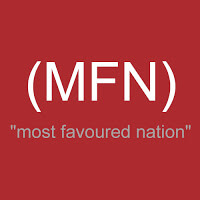Free Courses Sale ends Soon, Get It Now


Free Courses Sale ends Soon, Get It Now



Disclaimer: Copyright infringement not intended.
Context:
What is ‘most favoured nation’ status?
For example, if a country within the World Trade Organization would normally give a tariff of 5% to one country, but a tariff of 7% to other member countries. The most favored nation clause requires them to apply a 5% tariff to all member countries.
|
Tariffs A tariff is essentially a tax on imports and exportsImports and ExportsImports are the goods and services that are purchased from the rest of the world by a country’s residents, rather than buying domestically between trading countries. It is a policy that is usually in place to tax foreign goods and encourage the consumption of domestic products. Tariffs are also used as a form of income for a country’s government. For exporting countries, a low tariff is favorable, as the exporter can trade more freely.
Import Quotas Import quotas refer to a trade restriction that sets an upper limit on the number of goods that can be imported into a country over a given time. It encourages less consumption of foreign goods, and like tariffs, encourages the consumption of domestic products. For exporting countries, securing a high import quota is favorable, as the exporter can export more goods.
Free Trade Agreement A free trade agreement is a treaty or agreement in international law that forms a free-trade area between the cooperating countries. It encourages more trade and can result in eliminating tariffs and import quotasImport QuotasImport quotas are government-imposed limits on the quantity of a certain good that can be imported into a country. Generally speaking, such quotas are put in place to protect domestic industries and vulnerable producers..
Custom Unions Customs union is a type of trade bloc, which is an area of free trade within member countries that share a common external tariff with non-member countries. They are established through trade pacts and encourages more free trade between member countries. |
Cases of exceptions in MFN:
The WTO provides the following exemptions from MFN provisions for the following:
For countries outside the WTO, such as Iran, North Korea, Syria or Russian ally Belarus, WTO members can impose whatever trade measures they wish without flouting global trading rules.
Removal of MFN status:
Benefits of the Most-Favored-Nation Clause:
The most-favored-nation clause offers the following benefits:
The most-favored-nation clause increases trade creation and decreases trade diversion, essentially encouraging more free trade between countries. It allows more efficient outcomes since the lowest cost producers can export goods to areas with the highest demand without government intervention.
The most-favored-nation clause allows smaller countries to participate in advantages that they may not normally receive since they are overlooked among the large global trade players. The clause helps the small countries to negotiate favorable trade terms that they normally would not receive.
The implementation of the most-favored-nation clause simplifies the complex trade agreements established bilaterally between countries. If all countries are under the same trade terms, it makes trade laws much simpler.
MFN status is extremely gainful to developing countries. The clear upsides are access to a wider market for trade goods, reduced cost of export items owing to highly reduced tariffs and trade barriers. These essentially lead to more competitive trade.
MFN also cuts down bureaucratic hurdles and various kinds of tariffs are set at par for all imports. It then increases demands for the goods and giving a boost to the economy and export sector. It also heals the negative impact caused to the economy due to trade protectionism.
Disadvantage:
https://indianexpress.com/article/explained/most-favoured-nation-status-explained-russia-7816501/
© 2024 iasgyan. All right reserved